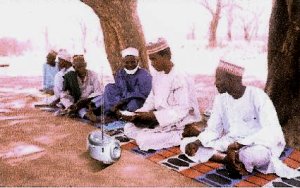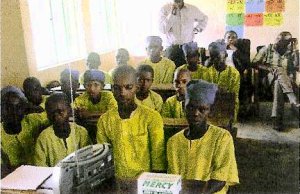Use of Radio in a Nomadic Education Programme
Country Profile: Nigeria
| Population | 148,980,000 (2007, UN estimate) |
|---|---|
| Poverty (Population living on less than US$1 per day): | 70.8% (1990-2004) |
| Official Languages | English, Hausa, Igbo, Yoruba and Edo |
| Access to Primary Education – Total Net Intake Rate (NIR) | 72% (2004) |
| Total Youth Literacy Rate (15-24 years) | 84% (1995-2004) |
| Adult Literacy Rate (15 years and over, 1995-2004) |
|
| Sources |
Programme Overview
| Programme Title | Use of Radio in a Nomadic Education Programme |
|---|---|
| Implementing Organization | National Commission for Nomadic Education (NCNE) |
| Date of Inception | 2000 |
Organization
National Commission for Nomadic Education (NCNE)
Context

Nomads constitute about 6% of the African population and are found in at least 20 different countries across the continent. They are categorised into three major groups based on their mobile lifestyle. The nomadic population in Nigeria accounts for 9.4 million people, including 3.1 million school-age children. The majority of them are pastoralists (7 million), while others are migrant fisher folk and farmers. The participation of the nomads in existing formal and non-formal education programmes used to be extremely low, with the population’s literacy rate ranging from 0.2% to 2.0% in 1988. National education systems have generally failed the nomadic communities. All the education indicators have revealed that the nomadic groups are at the bottom of the table in national statistics pertaining to enrolment rates, participation, classroom performance, gender balance, achievement, progression to the next level of education and training.
The major constraints to their participation in formal and non-formal education are:
- The nomadic peoples’ constant migrations/movements in search of water and pasture, in the case of the pastoralists, and fish, in the case of the migrant fishermen;
- The irrelevance of the school curriculum, which is tailored towards meeting the needs of sedentary groups and thus ignores the educational needs of nomadic peoples;
- The centrality of child labour to their production system, thus making it extremely difficult for children to participate in formal schooling;
- Their physical isolation, since they operate largely in inaccessible physical environments;
- A land tenure system that makes it difficult for the nomads to acquire land and settle in one place.
The Federal Government realised that unless a special educational provision was made for the nomads, they would have no access to formal and non-formal education. Thus, in line with the provisions of the 1979 Constitution and the National Policy on Education, which strongly urge the government to provide equal educational opportunities to all Nigerians, and in order to ensure that nomads have unfettered access to basic education, the Federal Government established the National Commission for Nomadic Education (NCNE) in 1989. The NCNE is charged with the implementation of the Nomadic Education Programme (NEP). The NEP is aimed at providing and widening access to quality basic education for nomads in Nigeria, boosting literacy and equipping them with skills and competences to enhance their well-being and participation in the nation-building process. To meet this challenge effectively, the Commission devised a series of innovative approaches and strategies.
Programme

In the course of the Commission’s efforts to increase access to basic education, it has experimented with the use of radio to provide open and distance education to pastoral nomads. The Interactive Radio Instruction (IRI) experiment started in 1992 with a regular radio programme aimed at mobilising, sensitising and empowering communities through the provision of services for the benefit of nomadic groups. Radio listening groups have been established and function in the same way as mobile learning circles.
Main Objectives
The objectives of using the radio for nomadic education were to:
- mobilise and sensitise nomadic pastoralists to appreciate the value of modern education;
- encourage nomads to contribute meaningfully towards the education of their children;
- increase the level of support and enthusiasm of nomads with a view to improving learners’ enrolment and attendance;
- motivate nomads (both men and women) to enrol in adult literacy programmes;
- inform nomads of modern animal husbandry practices as well as acquaint them with their civic responsibilities, including the formation of cooperative societies and radio listening groups; and
- improve the quality of teaching and learning, particularly where performance is low and teachers are poorly trained.
Implementation and Content of the Programme
Since 1996, the FRCN in Kaduna has allocated a 30-minute slot of air time to the Commission, through which it transmits a magazine programme entitled “Don Makiyaya a Ruga” (For the Nomads in their Homestead). The radio programme is participatory, and is thus widely accepted and appreciated by the nomads. It contains weekly news items, opinion pieces, interviews, discussions, music, drama, jingles, etc. The radio listening groups listen to this programme and respond using a feedback mechanism that has been set up to monitor the programme’s efficacy.
In 2000, a radio curriculum for the adult component of the Interactive Radio Instruction (IRI) was developed, based on which 13 episodes of radio programmes were produced. All the episodes were aimed at motivating the learners to embark on social action activities and were broadcast to the radio listening groups – regarded as learning centres – in each of the 36 states of the Federation and the Federal Capital Territory (FCT).
The success of the adult component of the IRI programme led to the launch of a school-based programme, which is currently being piloted using the model from the Opening Learning Systems Education Trust (OLSET) in South Africa.
Some of the themes of the radio programme include:

- the importance of adult education;
- learners’ enrolment and retention rates;
- education for girls;
- civic education;
- community development;
- environmental education;
- the formation of cooperative societies and radio listening groups;
- the empowerment of nomadic women through income-generating activities;
- family life education;
- health-related issues such as HIV/AIDS, STDs, etc.; and
- conflict and conflict resolution.
The following represent some of the strategies and activities used:
- public sensitisation and mobilisation through the Federal Radio Corporation of Nigeria (FRCN) in Kaduna;
- basic and functional literacy and numeracy;
- introduction of modern techniques of animal husbandry and processing of dairy products;
- co-operative organization and management;
- health and environmental education;
- a school-based IRI programme;
- basic e-learning centres; and
- periodic meetings with community leaders (Ardos and Sheikhs).
Meetings with Active Community Leaders

State Coordinators and Zonal Officers identify and meet periodically with active community leaders in a given state or zone. The aim of these meetings is to:
- interact and exchange ideas with the target group;
- identify problems in their various schools;
- collectively proffer solutions to the problems identified;
- sensitise the leaders towards learners’ enrolment and attendance rates; and
- mobilise the leaders on adult literacy, community development, education for girls, etc.
Achievements
To date, the Commission has established 138 adult literacy centres and 239 registered radio listening groups. Furthermore, an Open Broadcasting Van has been equipped to reach out to the nomads.
The Distance Learning Scheme, which aims to make basic education more accessible to nomadic children and adults, was the first of its kind in sub-Saharan Africa and its pilot phase was considered very successful. The post-broadcast survey revealed that the project was 75% successful. It also showed that 60% of the learners were inspired to embark on social action activities.

Meanwhile, the Commission has completed the recording of 26 episodes of the Distance Learning Programme for the Shuwa Arab and Kanuri pastoralists found mainly in Borno and around the Lake Chad Basin in the north-eastern part of Nigeria. Series of capacity-building workshops on the IRI methodology have been conducted on a regular basis for all categories of personnel, including teachers.
Two digital radio recording studios have been established. Similarly, two e-learning centres were launched by the Commission early this year and capacity-building workshops on both the IRI methodology and e-learning for teachers, including television scripting and editing, have been held regularly. 35 nomadic schools have been selected for the pilot study of the school-based IRI programme. Facilities have recently been installed in the Commission’s headquarters to boost its internet connectivity.
As a result of the innovative strategies adopted by the Commission, there have been great improvements in the quality of curriculum content delivery, with an overall improvement in the learning achievement of nomadic school children and adults.
Meetings have been held in over 10 states attended by more than 1000 pastoral community leaders thus far.
Challenges and Future Plans
For budgetary reasons, the activities mentioned above focused specifically on the pastoral nomadic communities, categorised as livestock producers. In the future, the programme needs to be extended to other nomadic groups.
Sustainability
Although financial limitations have been a problem, partnerships and links with other institutions have played a key role in enabling the Commission to expand the delivery of services.
Partners
So far, collaborations have been established with international agencies such as the United Nations Children's Fund (UNICEF), the United Nations Educational, Scientific and Cultural Organization (UNESCO), the United Nations Development Programme (UNDP), the Department For International Development (DFID), the British Council, the Japan International Cooperation Agency (JICA) and the United States Agency for International Development (USAID). Similarly, linkages and partnerships have also been established with a number of international NGOs such as the Support Programme for the Pastoral (PASEL) in Niger Republic, the Parliamentary Assembly of the Council of Europe (PACE) and the Association for the Promotion of Livestock Development in the Sahel and Savannah (APESS). Key stakeholders in the Nomadic Education Programme (NEP) are: the Pastoral Resolve (PARE), a national NGO, universities, national commissions (e.g. the Universal Basic Education Commission (UBEC), the National Commission for Mass Literacy, Adult and Non-Formal Education (NMEC)) and the Education Trust Fund (ETF), as well as federal, state and local governments.
Lessons Learned

The achievements and breakthroughs recorded are attributable to specific factors such as: the design and delivery strategies that were used; the mobilisation and sensitisation of the nomadic communities; the decentralisation of the decision-making processes; and the relatively effective coordination of the activities of the various agencies and communities involved in implementing the programme.
Interactive Radio Instruction has been a means of transmitting relevant government policies in education, health care, politics, social and economic welfare to grassroots groups. Because those who deliver these messages and activities have established long-standing and positive relationships with nomadic communities, the Commission has enjoyed the confidence of nomads in collaborating on sensitive issues such as the population census, HIV and AIDS, and diverse campaigns that have sought to support rural communities. The Commission has become a viable peace maker among ethnic and occupational groups in matters relating to grazing rights and farm encroachments, among others.
Contact
Dr. Nafisatu Dahiru Muhammad
Executive Secretary
National Commission for Nomadic Education
9 Kashim Ibrahim Road
P.M.B. 2343, Kaduna
Nigeria
E-mail: User: nafsykad
Host: (at) yahoo.com

